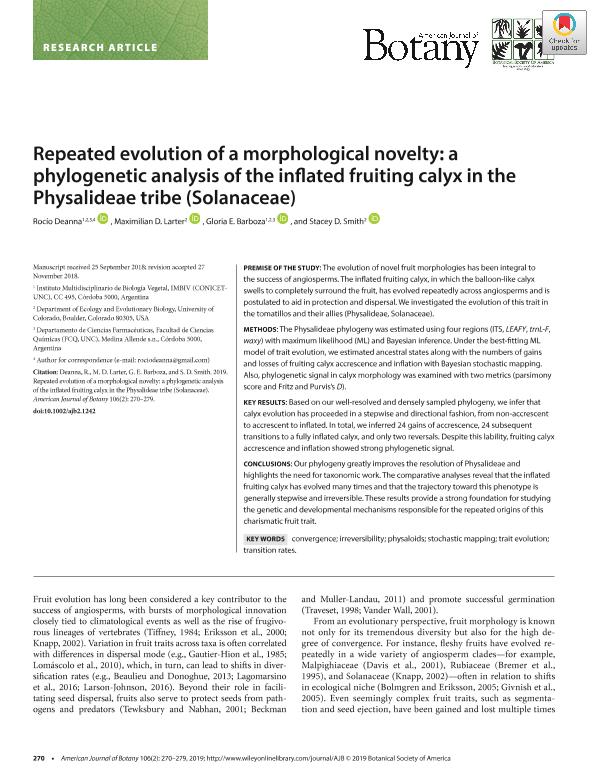Mostrar el registro sencillo del ítem
dc.contributor.author
Deanna, Rocío

dc.contributor.author
Larter, Maximilien
dc.contributor.author
Barboza, Gloria Estela

dc.contributor.author
Smith, Stacey Dewitt

dc.date.available
2020-07-14T17:11:08Z
dc.date.issued
2019-02
dc.identifier.citation
Deanna, Rocío; Larter, Maximilien; Barboza, Gloria Estela; Smith, Stacey Dewitt; Repeated evolution of a morphological novelty: A phylogenetic analysis of the inflated fruiting calyx in the Physalideae tribe (Solanaceae); Botanical Society of America; American Journal of Botany; 106; 2; 2-2019; 270-279
dc.identifier.issn
0002-9122
dc.identifier.uri
http://hdl.handle.net/11336/109233
dc.description.abstract
The evolution of novel fruit morphologies has been integral to the success of angiosperms. The inflated fruiting calyx, in which the balloon-like calyx swells to completely surround the fruit, has evolved repeatedly across angiosperms and is postulated to aid in protection and dispersal. We investigated the evolution of this trait in the tomatillos and their allies (Physalideae, Solanaceae). METHODS: The Physalideae phylogeny was estimated using four regions (ITS, LEAFY, trnL-F, waxy) with maximum likelihood (ML) and Bayesian inference. Under the best-fitting ML model of trait evolution, we estimated ancestral states along with the numbers of gains and losses of fruiting calyx accrescence and inflation with Bayesian stochastic mapping. Also, phylogenetic signal in calyx morphology was examined with two metrics (parsimony score and Fritz and Purvis?s D).KEY RESULTS: Based on our well-resolved and densely sampled phylogeny, we infer that calyx evolution has proceeded in a stepwise and directional fashion, from non-accrescent to accrescent to inflated. In total, we inferred 24 gains of accrescence, 24 subsequent transitions to a fully inflated calyx, and only two reversals. Despite this lability, fruiting calyx accrescence and inflation showed strong phylogenetic signal. Our phylogeny greatly improves the resolution of Physalideae and highlights the need for taxonomic work. The comparative analyses reveal that the inflated fruiting calyx has evolved many times and that the trajectory toward this phenotype is generally stepwise and irreversible. These results provide a strong foundation for studying the genetic and developmental mechanisms responsible for the repeated origins of this charismatic fruit trait.
dc.format
application/pdf
dc.language.iso
eng
dc.publisher
Botanical Society of America

dc.rights
info:eu-repo/semantics/openAccess
dc.rights.uri
https://creativecommons.org/licenses/by-nc-sa/2.5/ar/
dc.subject
CONVERGENCE
dc.subject
IRREVERSIBILITY
dc.subject
PHYSALOIDS
dc.subject
STOCHASTIC MAPPING
dc.subject
TRAIT EVOLUTION
dc.subject
TRANSITION RATES
dc.subject.classification
Biología

dc.subject.classification
Ciencias Biológicas

dc.subject.classification
CIENCIAS NATURALES Y EXACTAS

dc.title
Repeated evolution of a morphological novelty: A phylogenetic analysis of the inflated fruiting calyx in the Physalideae tribe (Solanaceae)
dc.type
info:eu-repo/semantics/article
dc.type
info:ar-repo/semantics/artículo
dc.type
info:eu-repo/semantics/publishedVersion
dc.date.updated
2020-07-13T16:11:53Z
dc.identifier.eissn
1537-2197
dc.journal.volume
106
dc.journal.number
2
dc.journal.pagination
270-279
dc.journal.pais
Estados Unidos

dc.journal.ciudad
St. Louis
dc.description.fil
Fil: Deanna, Rocío. University of Colorado; Estados Unidos. Consejo Nacional de Investigaciones Científicas y Técnicas. Centro Científico Tecnológico Conicet - Córdoba. Instituto Multidisciplinario de Biología Vegetal. Universidad Nacional de Córdoba. Facultad de Ciencias Exactas Físicas y Naturales. Instituto Multidisciplinario de Biología Vegetal; Argentina. Universidad Nacional de Córdoba. Facultad de Ciencias Químicas. Departamento de Farmacia; Argentina
dc.description.fil
Fil: Larter, Maximilien. University of Colorado; Estados Unidos
dc.description.fil
Fil: Barboza, Gloria Estela. Consejo Nacional de Investigaciones Científicas y Técnicas. Centro Científico Tecnológico Conicet - Córdoba. Instituto Multidisciplinario de Biología Vegetal. Universidad Nacional de Córdoba. Facultad de Ciencias Exactas Físicas y Naturales. Instituto Multidisciplinario de Biología Vegetal; Argentina. Universidad Nacional de Córdoba. Facultad de Ciencias Químicas. Departamento de Farmacia; Argentina
dc.description.fil
Fil: Smith, Stacey Dewitt. University of Colorado; Estados Unidos
dc.journal.title
American Journal of Botany

dc.relation.alternativeid
info:eu-repo/semantics/altIdentifier/url/https://bsapubs.onlinelibrary.wiley.com/doi/10.1002/ajb2.1242
dc.relation.alternativeid
info:eu-repo/semantics/altIdentifier/doi/https://doi.org/10.1002/ajb2.1242
Archivos asociados
